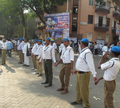 | |
| Abbreviation | SSD |
|---|---|
| Formation | 1927 |
| Founder | Bhimrao Ramji Ambedkar |
| Type | Ambedkarite volunteer, |
| Legal status | Active |
| Purpose | Supporting Prabuddha Bharata |
| Headquarters | Deekshabhoomi, Nagpur, Maharashtra, India |
| Coordinates | 21°7′41″N79°4′1″E / 21.12806°N 79.06694°E |
Region served | India [1] |
Official language | Hindi 22 Languages of India |
Commander In Chief | Miratai Ambedkar |
Main organ | The Buddhist Society of India |
| Affiliations | Scheduled Castes Federation |
| Volunteers | Soldiers for social justice and human dignity representative of India’s Depressed class. |
| Website | samatasainikdalindia |
Formerly called | Bhimsevak Dal |
Samata Sainik Dal, (Army of Soldiers for Equality [2] or Party of the Fighters for Equality [3] ) abbreviated as SSD, is a social organisation founded by B. R. Ambedkar in 1927 with the objective of safeguarding the rights of all oppressed sections of Indian society. [4] [5]

